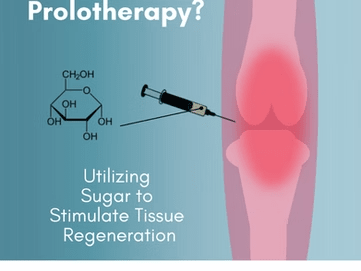
Some of the most common solutions used in prolotherapy are saline (saltwater), hypertonic dextrose (sugar water), and P2G (phenol-glycerine-glucose) — with dextrose being the principal solution used (Rabago 2010). These solutions cause low-grade inflammation at the affected site, which encourages internal repair without causing long-term damage to the tissue. Dextrose in particular is considered an ideal constituent of prolotherapy because it is water soluble, a normal component of blood, and can be administered safely in large quantities. Concentrations of hypertonic dextrose prolotherapy typically range from 12.5% to 25% (Houser et al. 2016). In laboratory studies of human fibroblasts and chondrocytes, dextrose exposure in concentrations as low as 0.5% resulted in cellular proliferation and growth factor production, which are essential for tissue regeneration (Reeves 2006).
Dextrose prolotherapy has been shown to reduce pain for athletes suffering from adductor tendinopathy. In one clinical study, dextrose prolotherapy treatment brought 20 out of 24 subjects from a full prevention of sports participation to feeling no pain at the affected areas, with 22 of the subjects being able to participate unrestricted by the end of the study (Topol et al. 2005). Dextrose prolotherapy has been used to treat nonspecific lower back pain, and has shown positive results in feedback from patients. In another clinical trial, 35 of 40 patients receiving dextrose prolotherapy reported a 50% decrease in pain at 6 months, while only 16 of 41 patients in the control group reported the same reduction in pain (Ongley et al. 1987).
Hauser RA, Lackner JB, Steilen-Matias D, Harris DK. A Systematic Review of Dextrose Prolotherapy for Chronic Musculoskeletal Pain. Clin Med Insights Arthritis Musculoskelet Disord. 2016;9:139-159.
Ongley MJ, Klein RG, Dorman TA, Eek BC, Hubert LJ. A new approach to the treatment of chronic low back pain. Lancet. 1987;2(8551):143-146.
Rabago D, Slattengren A, Zgierska A. Prolotherapy in primary care practice. Prim Care. 2010;37(1):65-80.
Reeves KD. Prolotherapy: injection of growth factors or growth factor production stimulants to growth normal cells or tissue. Pain Management. Philadelphia: Elsevier; 2006. pp. 1106–27.
Reeves KD, Sit RW, Rabago DP. Dextrose Prolotherapy: A Narrative Review of Basic Science, Clinical Research, and Best Treatment Recommendations. Phys Med Rehabil Clin N Am. 2016;27(4):783-823.
Sit RW, Chung VCh, Reeves KD, et al. Hypertonic dextrose injections (prolotherapy) in the treatment of symptomatic knee osteoarthritis: A systematic review and meta-analysis Sci Rep. 2016;6:25247.
Topol GA, Reeves KD, Hassanein KM. Efficacy of Dextrose Prolotherapy in Elite Male Kicking-Sport Athletes with Chronic Groin Pain. Archives of Physical Medicine and Rehabilitation, vol. 86, no. 4, Apr. 2005, pp. 697–702.
#prolotherapy #polysaccharides #tissueregeneration #growthfactors
© 2025 Molecular Matrix, Inc. All rights reserved.